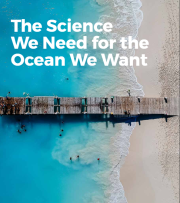More than fifty experts from 12 countries within and outside the region gathered on 15-17 October 2018, Shanghai, China for the microplastics science symposium and the second WESTPAC workshop on distribution, source, fate and impacts of marine microplastics in Asia and the Pacific.
The two WESTPAC events were hosted and generously supported by the East China Normal University (ECNU), aiming to share the latest research findings on microplastics and explore partnership building opportunities and directions of future collaborative research in the region. Several members of the Joint Group of Experts on the Scientific Aspects of Marine Environmental Protection (GESAMP) also took part in the two events.
Our planet is drowning in plastic pollution. The term of microplastic was introduced to describe small pieces of plastic found in the ocean, commonly defined as < 5mm in diameter. The microplastics were either produced as a result of fragmentation from larger items or these Plastic pellets and plastic particles manufactured for particular applications, such as cosmetic products.
Microplastics (MPs) are ubiquitous, ranging from the beach sediment, water column, ocean sediment to the deepest ocean trenches, from Antarctic to Arctic, from the remote location to populous areas. There has been a mounting concern over the potential impact of MPs to human health, as MPs, due to their tiny size, could be ingested and accumulated in the bodies of many organisms such as mammals, sea birds, sea turtles, fishes and invertebrates. Moreover, Microplastics can be a source and sink of hazardous chemicals to organisms.
WESTPAC started to concert the efforts of research communities in April 2017, in order to understand the sources, distribution, fate and effects of marine MPs in the Western Pacific and its adjacent waters. The microplastics science symposium on 15 October 2018 focused on the recent scientific findings concerning the distribution and the impacts of microplastic in the marine environment, and the present research, assessment approaches, methods and techniques.
Following the Symposium, the second WESTPAC workshop was held with objectives to finalize, with feedbacks received from the pilot sites, the draft guideline for microplastic sampling and analysis in beach sediment; to develop a harmonized microplastic sampling and analysis protocol in surface water; to review the progress made since last year in the pilot sites and by two working groups (microplastics in surface water and marine organisms); and to explore partnership building opportunities and future research directions, while taking into account the results generated from the science symposium on the first day.
The two-day workshop featured an ever-increasing research interest and capacity in participating countries, as demonstrated by substantial progresses made, since the first workshop, in Bangladesh, China, Indonesia, Korea, Japan, Malaysia, Singapore, Sri Lanka, Thailand and Vietnam. Technical dialogues were conducted at the 2nd workshop among experts in order to better understand problems and challenges that each country has been faced when carrying out their MP sampling and laboratory analysis in beach, water and marine biota.
The workshop concluded with a tangible workplan for the next two years, including the finalization, by the end of 2018 of the guidelines for sampling and laboratory analysis, preparation of two sets of guidelines, respectively for sampling and laboratory analysis of MPs in surface water and mussel (as a reference species) by the end of March 2019. The workshop also recognized the need to look into the MP presence in corals by setting up a small group of experts who are interested in this field.
“We are truly delighted to see tremendous progress made over such a short period, and encouraged to deepen cooperation among all of us in MP research and monitoring, including the assessment of its ecological impact,” expressed by many participants at the end of the workshop.




